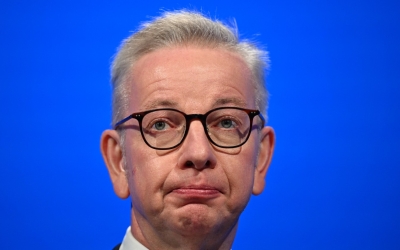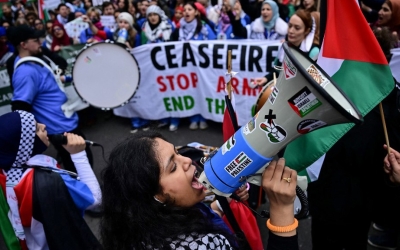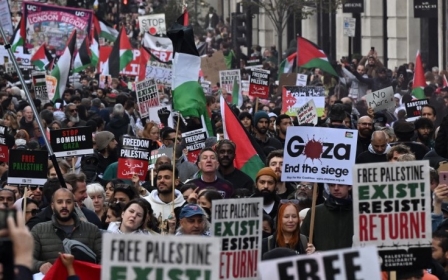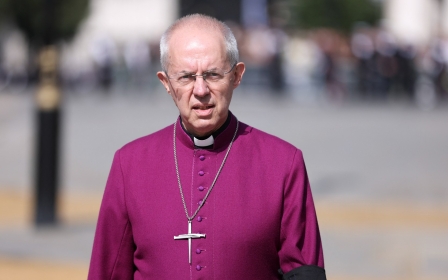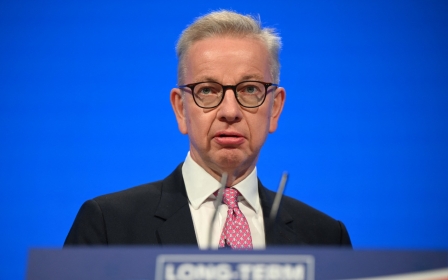UK government targets Muslim groups with new definition of extremism
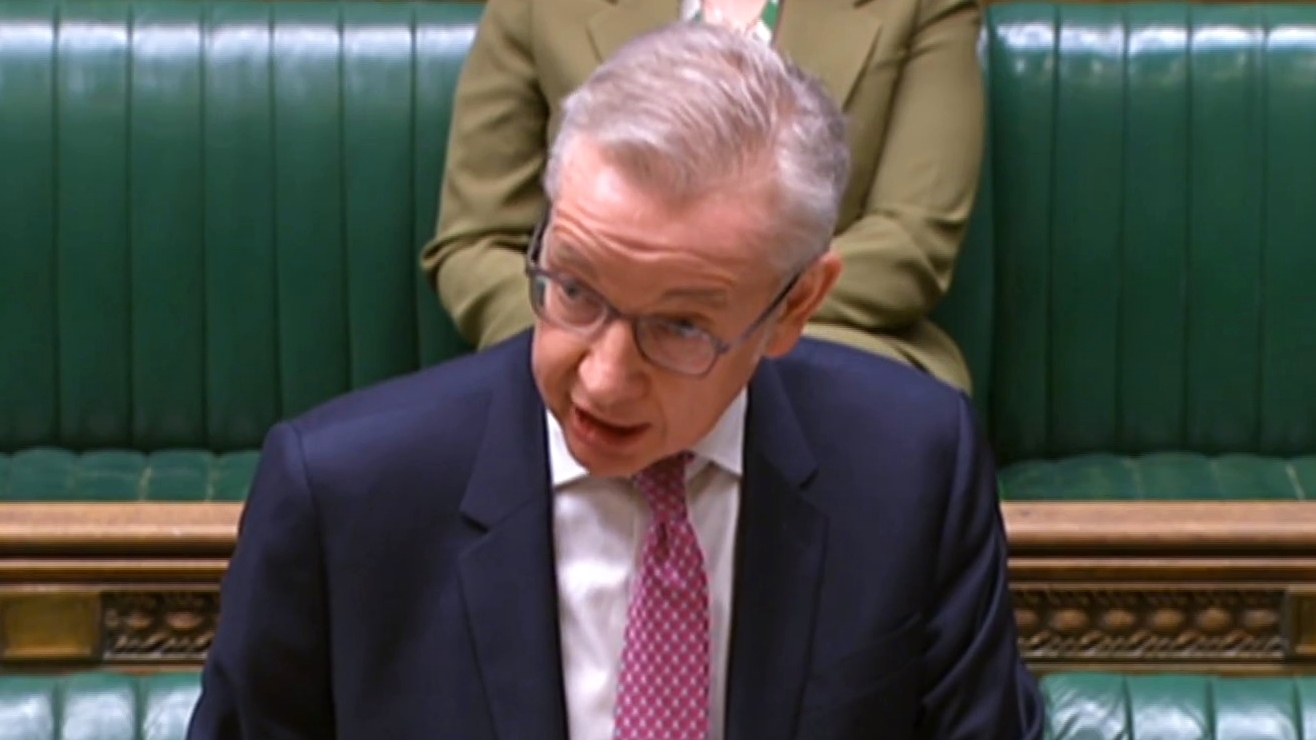
The UK government on Thursday announced its contentious new definition of extremism but conceded that the wording is “non-statutory” and creates no new legal powers amid concerns it will be used to target the Muslim community and pro-Palestine advocacy organisations.
Speaking in parliament, communities secretary Michael Gove identified a number of Muslim organisations, including the Muslim Association of Britain (MAB), which he said the government planned to "hold to account" using the new definition because of their "Islamist orientation".
In an earlier statement, Gove's Department for Levelling Up, Housing and Communities said the definition had been updated to respond to an “increased extremist threat since October 7 terror attacks in Israel”, citing a rise in reported antisemitic and anti-Muslim hate crimes.
It said the new definition would be used by government departments and officials to help them decide which groups they should engage with and fund, and to identify “extremist organisations, individuals and behaviours”.
But it said: “This definition is not statutory and has no effect on the existing criminal law - it applies to the operations of Government itself.”
New MEE newsletter: Jerusalem Dispatch
Sign up to get the latest insights and analysis on Israel-Palestine, alongside Turkey Unpacked and other MEE newsletters
Criticism of the definition continued to grow on Thursday as a number of Muslim community organisations and equality and human rights campaigners condemned the proposals.
The Muslim Council of Britain (MCB), the largest body representing Muslims in the UK, said it was concerned that some organisations affiliated with it would be targeted by the definition, and described the plans as "undemocratic, divisive, and potentially illegal".
Zara Mohammed, secretary general of the MCB, said: “As the government presses ahead with its flawed proposals, many of us are questioning: on what grounds are these groups being labelled as extremist, and will there be legal avenues to challenge such determinations imposed by the government?"
The Runnymede Trust, a race equality think tank, described the definition as an "attack on civil society".
"It has bypassed parliamentary scrutiny and will likely shut down organisations supporting people of colour, who are critical of the government of the day," it said in a post on the social media platform X.
"This definition governs what people are thinking, rather than doing, and will likely silence those who oppose the govt's position, for example on pro-Palestinian marches and critical race theory. Muslim groups and orgs supporting people of colour will be targeted as a result."
'Smash and grab'
Amnesty International described the definition as a "smash and grab on our human rights", while Liberty called it "deeply cynical and completely unworkable".
In a statement, the organisers of a series of national protests calling for a ceasefire in Gaza, said the definition was an "assault on core democratic freedoms".
"We reject the description of members of our coalition as extremists," said the statement, signed by the Palestine Solidarity Campaign, the Stop the War coalition, Friends of al-Aqsa, the Campaign for Nuclear Disarmament, the Palestinian Forum in Britain, and MAB.
"We are united as a coalition and will not allow Gove's intervention to distract us from standing in solidarity with a people confronting genocide, ethnic cleansing, occupation, and apartheid."
'Extremism is the promotion or advancement of an ideology based on violence, hatred or intolerance'
- the new UK government definition of extremism
Responding to Gove in parliament, Angela Rayner, Labour’s shadow communities secretary, criticised how details of the definition and speculation about groups set to be named had been leaked to the media before the official announcement.
But she said Gove's statement did not go far enough and called on the government to revise its nine-year-old counter-extremism strategy.
“Regardless of how workable and effective this new definition is, this announcement will not be enough,” said Rayner.
Alison Thewliss, speaking for the Scottish National Party, noted that Friday 15 March is designated by the United Nations as the international day to combat Islamophobia, but said that "Muslims are afraid to speak out, lest they be targeted for their beliefs or, indeed, labelled as extremists".
The UK government has rejected the widely used term Islamophobia, preferring instead to refer to anti-Muslim hatred.
The new definition replaces a previous definition originally set out in the 2011 Prevent counter-terrorism strategy. It reads:
Extremism is the promotion or advancement of an ideology based on violence, hatred or intolerance, that aims to:
1. negate or destroy the fundamental rights and freedoms of others; or
2. undermine, overturn or replace the UK’s system of liberal parliamentary democracy and democratic rights; or
3. intentionally create a permissive environment for others to achieve the results in (1) or (2).
Commenting in the government's statement, Gove said: "The pervasiveness of extremist ideologies has become increasingly clear in the aftermath of the 7 October attacks and poses a real risk to the security of our citizens and our democracy.
"This is the work of extreme right-wing and Islamist extremists who are seeking to separate Muslims from the rest of society and create division within Muslim communities. They seek to radicalise individuals, deny people their full rights, suppress freedom of expression, incite hatred, and undermine our democratic institutions."
Speaking in parliament, Gove took aim at groups which he described as having "Islamist" and "neo-Nazi" ideologies, and named several organisations as examples.
"Islamist and neo-Nazi groups in Britain are operating lawfully, but they advocate and work towards the replacement of democracy with an Islamist or Nazi society," he said.
Gove described Islamism as a "totalitarian ideology" which called for the establishment of an Islamic state under Sharia law and sought to overthrow "liberal democratic principles".
He said it was an ideology rooted in the ideas of the Egyptian Muslim Brotherhood leaders and scholars Hassan al-Banna and Sayyid Qutb and the South Asian Jamaat-e-Islami movement.
Gove said: "Organisations such as the Muslim Association of Britain, which is the British affiliate of the Muslim Brotherhood, and other groups such as Cage and Mend, give rise to concern for their Islamist orientation and views. We will be holding these and other organisations to account to assess if they meet our definition of extremism and we will take action as appropriate."
Abuse of privilege
In a statement, Raghad Altikriti, chair of MAB, called on Gove to make the same statement outside of parliament where he could be legally challenged.
Altikriti said: "Singling out mainstream, law-abiding British Muslim organisations who have contributed to the common good, sets a dangerous precedent undermining democracy, religious freedoms, and free speech.
"Michael Gove shamelessly abuses parliamentary privilege to deflect scrutiny and accountability."
Both Cage International, which campaigns about the impact of counter-terrorism policies in Muslim communities, and Mend, a Muslim community advocacy organisation, also condemned Gove's statement.
Azhar Qayum, chief executive of Mend, told LBC radio: "We've sent legal notice to the government threatening legal action if they cite us on any such list."
In a statement, Qayum said: "We challenge Michael Gove to repeat his claims outside of parliament and without the protection of parliamentary privilege if he believes he can provide the evidence to back up his view that Mend has called for the establishment of an ‘Islamic state governed by sharia law’.”
Commenting on X, Mend accused Gove of using "parliamentary privilege to slander".
In a joint statement also signed by activist groups Palestine Action and Black Lives Matter UK, Cage International said: "We reject the counter-extremism and counter-terrorism powers that allow for arbitrary and authoritarian interventions against dissenting citizens.
"Collectively we will explore all avenues, including legal, to challenge the Government’s deep dive into authoritarianism."
Both Gove and Prime Minister Rishi Sunak had previously suggested that the new measures could be targeted against pro-Palestinian activism and groups alleged to be proponents of Islamist ideology.
But they were urged to revise the measures earlier this week by the archbishops of Canterbury and York, Justin Welby and Stephen Cottrell, who warned they would “disproportionately target Muslim communities”.
The archbishops’ intervention came after a trio of leading campaign groups - Amnesty International, Liberty and Friends of the Earth - also condemned expected details of the new counter-extremism plans as “profoundly undemocratic”.
Gove was also cautioned about the measures in an open letter signed by three former home secretaries in previous Conservative governments.
Commenting on the new definition, Mohammed of the MCB alluded to recent controversies involving the governing Conservatives, such as comments by former home secretary Suella Braverman.
Writing in the Telegraph newspaper last month, Braverman said Islamists were "bullying our country into submission" and were now "in charge", and described pro-Palestinian protesters as "Islamist cranks and Left-wing extremists".
Mohammed asked whether the new definition would be applied to "vocal extremists who support the Conservative Party".
"In recent weeks, we’ve witnessed genuine extremism as leaders of the Conservative Party have smeared prominent Muslim politicians with the vague ‘Islamist’ label, perpetuating divisive narratives about Muslims purportedly plotting to seize control of the country. The smears are coupled with a disgraceful demonisation of thousands of protesters calling for peace in Gaza," she said.
In addition to the new definition, Gove on Thursday announced plans for a new "counter-extremism centre of excellence" within his department. He said this would help the government to understand "the role played by state actors and state-linked organisations in extremist activity that is taking place in our country".
Middle East Eye delivers independent and unrivalled coverage and analysis of the Middle East, North Africa and beyond. To learn more about republishing this content and the associated fees, please fill out this form. More about MEE can be found here.


